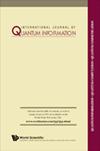The security analysis of the BB84 protocol in the case of Calderbank–Shor–Steane code leakage
IF 0.7
4区 物理与天体物理
Q3 COMPUTER SCIENCE, THEORY & METHODS
引用次数: 0
Abstract
Quantum key distribution (QKD) allows authenticated parties to share secure keys. Its security comes from quantum physics rather than computational complexity. The previous work has been able to demonstrate the security of the BB84 protocol based on the uncertainty principle, entanglement purification and information theory. In the security proof method based on entanglement purification, it is assumed that the information of Calderbank–Shor–Steane (CSS) error correction code cannot be leaked, otherwise, it is insecure. However, there is no quantitative analysis of the relationship between the parameter of CSS code and the amount of information leaked. In the attack and defense strategy of the actual quantum key distribution system, especially in the application of the device that is easy to lose or out of control, it is necessary to assess the impact of the parameter leakage. In this paper, we derive the relationship between the leaked parameter of CSS code and the amount of the final key leakage based on the BB84 protocol. Based on this formula, we simulated the impact of different CSS code parameter leaks on the final key amount. Through the analysis of simulation results, the security of the BB84 protocol is inversely proportional to the value of [Formula: see text] and [Formula: see text] in the case of the CSS code leak.Calderbank–Shor–Steane代码泄漏情况下BB84协议的安全性分析
量子密钥分发(QKD)允许经过身份验证的各方共享安全密钥。它的安全性来自量子物理,而不是计算复杂性。基于不确定性原理、纠缠净化和信息论,前人的工作已经能够证明BB84协议的安全性。在基于纠缠净化的安全证明方法中,假设CSS (calderbank - shorr - steane)纠错码信息不能泄露,否则是不安全的。但是,目前还没有对CSS代码参数与信息泄露量之间的关系进行定量分析。在实际量子密钥分配系统的攻防策略中,特别是在易丢失或失控设备的应用中,有必要对参数泄露的影响进行评估。本文基于BB84协议推导了CSS代码的泄露参数与最终密钥泄露量之间的关系。基于此公式,我们模拟了不同CSS代码参数泄漏对最终密钥量的影响。通过仿真结果分析,在CSS代码泄漏的情况下,BB84协议的安全性与[公式:见文]和[公式:见文]的值成反比。
本文章由计算机程序翻译,如有差异,请以英文原文为准。
求助全文
约1分钟内获得全文
求助全文
来源期刊

International Journal of Quantum Information
物理-计算机:理论方法
CiteScore
2.20
自引率
8.30%
发文量
36
审稿时长
10 months
期刊介绍:
The International Journal of Quantum Information (IJQI) provides a forum for the interdisciplinary field of Quantum Information Science. In particular, we welcome contributions in these areas of experimental and theoretical research:
Quantum Cryptography
Quantum Computation
Quantum Communication
Fundamentals of Quantum Mechanics
Authors are welcome to submit quality research and review papers as well as short correspondences in both theoretical and experimental areas. Submitted articles will be refereed prior to acceptance for publication in the Journal.
 求助内容:
求助内容: 应助结果提醒方式:
应助结果提醒方式:


